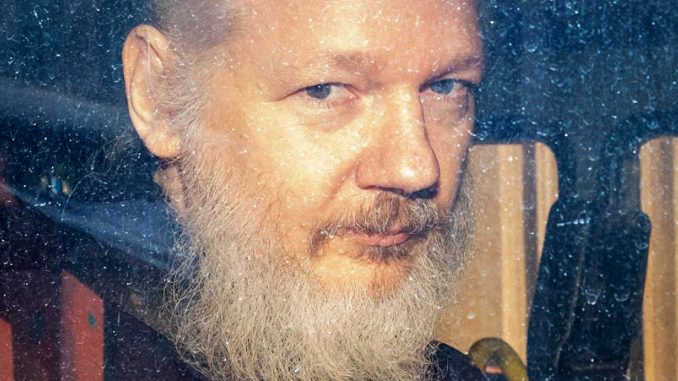
- WikiLeaks founder Julian Assange had been holed up in the Ecuadorian Embassy in London since 2012.
- He is now facing possible extradition to the U.S. to face computer hacking charges related to his collaboration with Chelsea Manning.
- The case against him is shaping up to be major test of the principles of a free press in the U.S. vs. the government’s legitimate need to keep security secrets.
London’s Metropolitan Police arrested WikiLeaks founder Julian Assange at the Ecuadorian Embassy in the British capital on Thursday. The arrest came after Ecuador dropped Assange’s asylum status, effectively evicting him from their embassy.
Assange hadn’t left the embassy since August 2012, fearing that if he stepped off Ecuador’s diplomatic soil he would be arrested and extradited to the U.S. for publishing thousands of classified military and diplomatic cables through WikiLeaks.
The police said Assange was detained “on a warrant issued by Westminster Magistrates’ Court on 29 June 2012, for failing to surrender to the court.” They later confirmed he was also placed under arrest “on behalf” of U.S. law enforcement authorities, who had filed a formal extradition request. The Department of Justice unveiled its long-secret indictment against Assange later on Thursday, which shows he’s facing at least one computer hacking charge
Video captured by Russian news agency Ruptly showed police removing Assange, 47, from the embassy on Thursday in handcuffs. His hair appeared to have grown significantly longer and whiter since his last appearance, and he had a long grey beard.
The police said they were “invited into the embassy by the Ambassador, following the Ecuadorian government’s withdrawal of asylum.” Ecuador’s government said it had dropped it’s protection of Assange, “for repeatedly violating international conventions and protocol of coexistence.”
Assange guilty of bail breach
A British court found Assange guilty on Thursday afternoon of breaching the conditions of his bail, a relatively minor infraction that could bring up to a year-long prison sentence.
Judge Michael Snow quickly issued his verdict after Assange appeared in the courtroom where his supporters packed the public gallery. Assange faces a sentence of up to 12 months for the conviction, in addition to the more has serious charges pending in the United States.
The basis of Assange’s defense was that he couldn’t expect a fair trial in British courts as the U.K.’s purpose was to “secure his delivery” to the United States.
Britain’s Press Association quoted a U.S. government representative who was in the court on Thursday, James Hines, as saying that police had testified that Assange, “barged past them, attempting to return to his private room” when they showed up to serve their arrest warrant at the embassy.
“He was eventually arrested at 10:15 a.m. He resisted that arrest, claiming ‘this is unlawful’ and he had to be restrained,” the court was told, according to Hines. He said Assange had resisted throughout the arrest, shouting “this is unlawful, I’m not leaving.”
U.S. unseals Assange indictment
The Justice Department’s unsealed indictment shows that Assange has been charged with computer hacking crimes for trying to illegally access “secret” materials on a U.S. government computer. The charge is officially listed as “conspiracy to commit computer intrusion.”
The indictment accuses Assange of trying to access the secret material “with reason to believe that such information so obtained could be used to the injury of the United States and the advantage of any foreign nation.”
The charges relate to materials stolen by former Army intelligence analyst Chelsea Manning, who was convicted in 2013 of leaking classified government and military documents to WikiLeaks. She had worked as an intelligence analyst in Iraq and was arrested in 2010. Manning is transgender and at the time of her arrest, her name was Bradley.
Manning was jailed again last month for refusing to testify to a grand jury investigating WikiLeaks. U.S. District Judge Claude Hilton ordered Manning to jail for contempt of court in March after a brief hearing in which Manning confirmed she had no intention of testifying.
She served seven years of a 35-year military sentence for leaking the trove of documents to the anti-secrecy website before then-President Obama commuted her sentence in 2017 — one of his final acts as president. In May that year, she was released from a Kansas military prison.
The indictment against Assange alleges that the “primary purpose of the conspiracy was to facilitate Manning’s acquisition of classified information related to the national defense of the United States so that WikiLeaks could publicly disseminate the information on its website.”
Assange faces a maximum penalty of five years in prison, the U.S. Justice Department said.
Arrest follows court document’s accidental publication
CBS News sought comment from U.S. law enforcement agencies following Assange’s arrest, but the FBI and National Security Agency had little to say.
A statement by London’s Metropolitan Police confirming that Assange had been “arrested in relation to an extradition warrant on behalf of the United States authorities” was the first official confirmation from either side of the Atlantic of an official extradition request.
A court document published in “error” last year, in an unrelated case in Virginia, suggested strongly that prosecutors had prepared charges against him under seal — something sources would not deny to CBS News.
Britain’s Foreign Secretary Jeremy Hunt said in a statement that Assange was “no hero.”
“He has hidden from the truth for years and years and it is right that his future should be decided in the British judicial system,” Hunt said. “This will now be decided properly, independently by the British legal system respected throughout the world for its independence and integrity and that is the right outcome.”






Be the first to comment